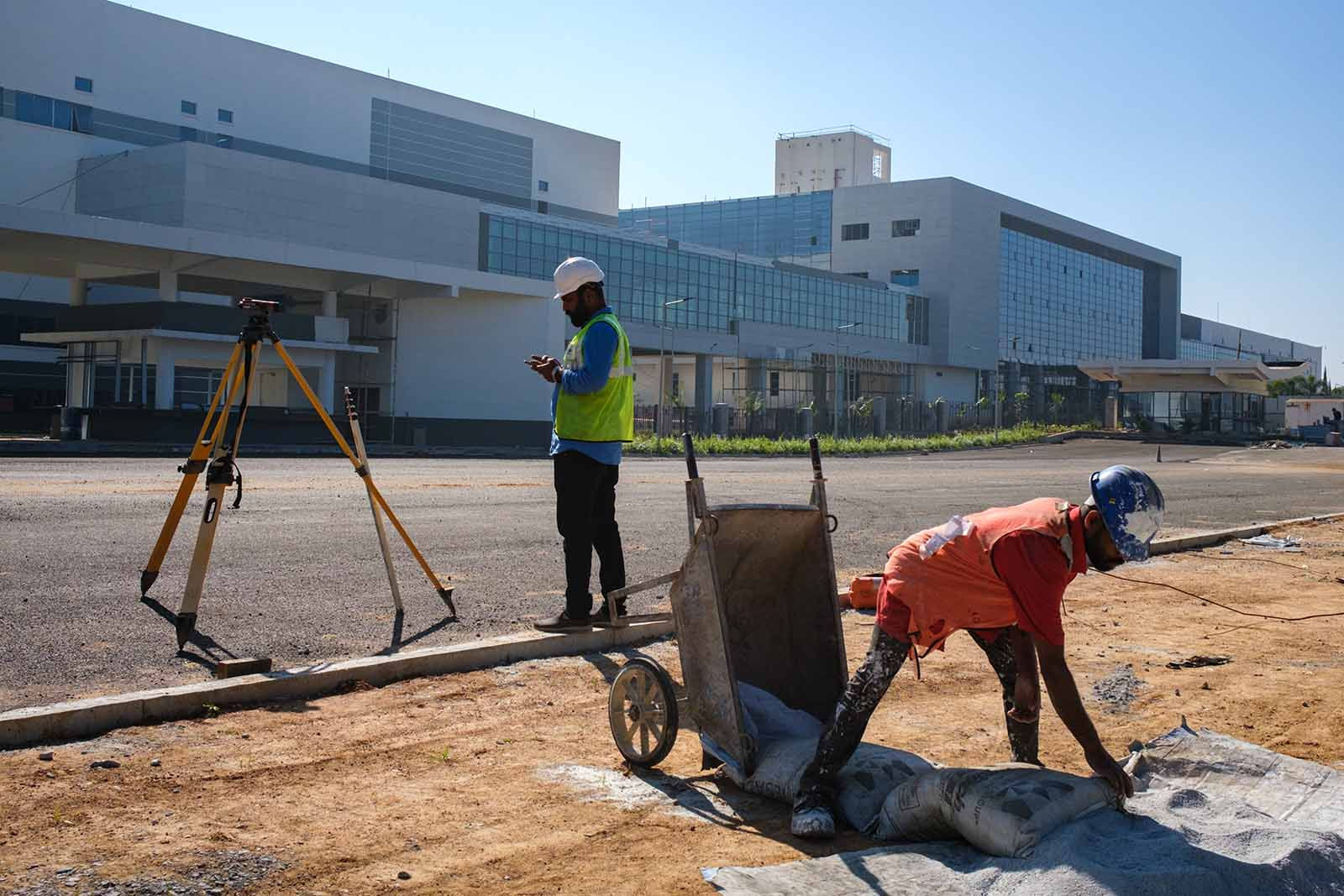Foxconn's US$1.6 billion bid to build iPhones in India

Source:Pei-Yin Hsieh
Foxconn is investing US$1.6 billion to expand iPhone production in India, aiming to manufacture 25% of its iPhones there by 2025. Is this a pipe dream?
Views
Foxconn's US$1.6 billion bid to build iPhones in India
By Meng-hsuan Yangweb only
Beginning in the second half of this year, a major construction project started taking place at a spot about 30 kilometers north of downtown Bengaluru.
Google Streetview photos from November show signs next to the construction site that read "property of Foxconn", "Sinotech Engineering", and "Bengaluru Elephant Plan".
This may be the key to accelerating the production of iPhones in India as early as 2024.
Earlier this year, when Hon Hai Technology Group (Foxconn) Chairman Young Liu (劉揚偉) met with officials in Karnataka, the local government christened the Foxconn investment the "Elephant Plan". In May, Foxconn spent NT$1.1 billion to purchase 1.21 million square meters of land for the future plant.
Three years of investment at once
Two weeks ago, Foxconn made a major announcement: It was investing US$1.6 billion to build the plant in India. This amount exceeded Foxconn’s investment in India over the last three years.
A December 9 article in The Wall Street Journal spilled the beans: "Construction at Karnataka is underway...Officials say that Foxconn has already greenlit nearly US$1 billion in investments in the plant, with additional investments worth 0.6 billion pending approval."
In January of this year, Commonwealth Magazine sent its reporters to the Sriperumbudur industrial zone in the suburbs of Chennai to witness the hub of Foxconn's iPhone assembly lines.
The plant in Karnataka will commence operations in April of next year. The goal is to achieve an annual production of 20 million smartphones within the next two to three years. The majority of them will be iPhones.
Foxconn's enormous investment in India shows that Apple wants to ramp up iPhone production in India.
According to J.P. Morgan, Apple's goal is to manufacture a quarter of all its iPhones in India by 2025.
But Ming-Chi Kuo (郭明錤), Analyst at TF International Securities, predicted in November that Apple may reach its goal a year early.
 Foxconn provides over 80 percent of the iPhone manufacturing volume in India. (Photo: Pei-Yin Hsieh)
Foxconn provides over 80 percent of the iPhone manufacturing volume in India. (Photo: Pei-Yin Hsieh)
On the other hand, a senior manager at Apple revealed that although Foxconn controls almost 80% of all iPhone production capacity in India, its output this year just surpassed 10 million. That's still a ways from 25%, or 50 million iPhones.
This is why the manufacturing facility in Karnataka is critical. In the next two to three years, it will churn out 20 million phones a year, helping close the gap.
Another key reason Apple is ramping up production in India is because it sees great growth potential in the Indian market.
A report from Morgan Stanley forecasts that the Indian market will contribute 15% of Apple's revenue in the next five years. Since iPhone's current market share in India is just 6%, there's plenty of room to grow.
Tata buys out Wistron with state backing
In addition to Foxconn's own plans for the future, the Tata Group's acquisition of Wistron India and its iPhone assembly lines is another important catalyst.
In late October, Wistron sold its Indian subsidiary to Tata Electronics for almost NT$4 billion, making Tata the first Indian company to secure a spot in the iPhone assembly value chain.
Tata represents India's national might. "It's like how Korea supports Samsung and Hyundai," says a Taiwanese businessman working in India.
One illustrative example of this is Tata Electronics’ appointing the ex-president of Intel Foundry Services, Randhir Thakur, as its CEO. He was headhunted by none other than Indian Prime Minister Narendra Modi. Modi asked him to use his experience in the United States to help nurture the development of the semiconductor and electronics industries in his home country.
Apple has also promised that, after Tata takes over, the factory will become an NPI (new product introduction) plant, where the most high-end products will be developed.
What's more, Business Line disclosed this April that after Tata acquires Wistron India, it may set its sights on Pegatron's iPhone assembly lines in India.
According to word on the supply chain and industry analysts grapevine, Tata is in talks with Pegatron to form a joint venture that will move parts of Pegatron's iPhone assembly lines in Shanghai to India.
 Tata Electronics acquired Wistron’s Indian iPhone production line at the end of October. (Photo: Pei-Yin Hsieh)
Tata Electronics acquired Wistron’s Indian iPhone production line at the end of October. (Photo: Pei-Yin Hsieh)
When will the parts supply chain come online?
In recent years, Pegatron has been on the fence about whether it wants to continue selling to Apple. It would come as no surprise if it chooses to work with Tata.
Compared to assembly plants, which have not stopped expanding their capacity, the smartphone parts supply chain has been slow to come to fruition.
A Taiwanese businessman working in India has observed that quite a few senior managers who work in Taiwanese companies on the Apple supply chain have flown to India to conduct evaluations this year. But does this mean they will really set up shop? "This should become more transparent after March of next year," he says.
Even iPhone batteries may one day be made in India. Rajeev Chandrasekhar, the Union Minister of State for Electronics and Information Technology, has announced that TDK will be building a plant near New Delhi to manufacture iPhone batteries.
The Financial Times reports that the Chinese battery manufacturer Desay has been encouraged to establish new factories in India, while the Taiwanese battery supplier Simplo Technology has been asked to scale up production in India for future orders, because Apple has plans to move iPhone 16 battery production to India.
Kuo says that the development process of iPhone 17 may be initiated in India next year. It would be the first time Apple designs and manufactures a new iPhone outside of China, and would be a milestone for India's tech industry.
The year 2024 will be key. Success or failure in expanding capacity and setting up the supply chain will decide how quickly India can become part of the iPhone supply chain.
Have you read?
Translated by Jack Chou
Edited by TC Lin
Uploaded by Ian Huang






